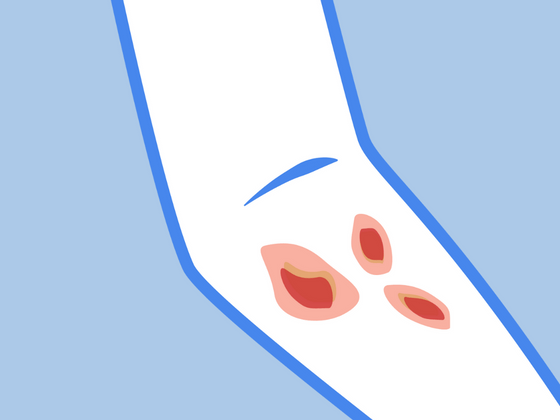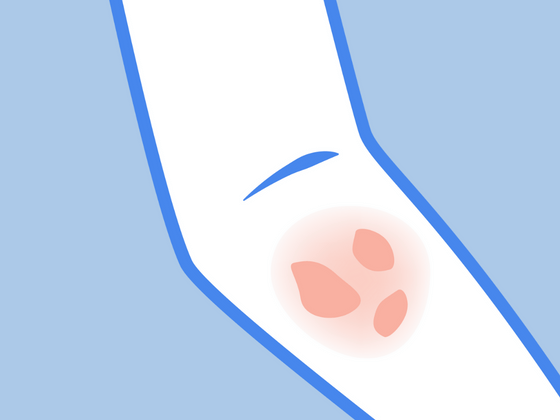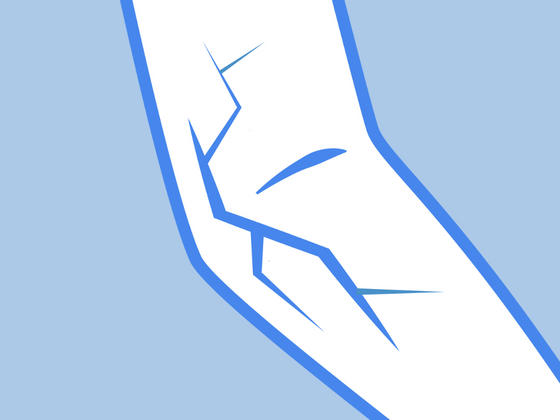Eczema is a common skin condition that can appear anywhere on the body – including the nipples. Characterized by redness, itchiness, and inflammation, it can be physically uncomfortable, as well as emotionally painful.
In this post, we discuss causes and symptoms of nipple eczema, plus natural ways to treat eczema on the nipple
Please keep in mind that although what we discuss in this post can relieve eczema, we are in no way medical professionals. If you’re experiencing severe eczema symptoms like an infection, it is best to seek medical advice immediately.
What Does Nipple Eczema Look Like?
Eczema on the nipple can affect one or both nipples. It may appear as an itchy, scaly, and irritated rash on the nipple itself or the areola, which is the dark skin surrounding the nipple.
The condition can appear in isolation, or it may develop along with eczema on other parts of the body. It rarely extends to the rest of the breast.
If you suffer from nipple eczema, you may notice that the nipple or areola is red, oozing, cracked, crusted, and tender. In some cases, the skin may be weepy and there may be nipple discharge.
Who is at Risk of Developing Eczema on Nipple?
Anyone can experience nipple eczema but it is often diagnosed in teenage girls, even if they do not have a prior history of atopic dermatitis.
It can also affect breast-feeding women, especially if they have easily irritated skin or a history of eczema. Non-breastfeeding women and men who have a history of eczema or sensitive skin may also develop this condition.
Causes of Nipple Eczema
Like all types of eczema, nipple eczema is caused by a genetic predisposition and environmental factors. Those who have a history of atopic dermatitis are more likely to develop nipple eczema.
External irritants that can make nipple eczema worse include contact with certain articles of clothing, laundry detergents, eczema soap, and skincare products that contain harsh chemicals.
How to Treat Nipple Eczema Naturally
While there is unfortunately no cure for eczema, there are ways to manage symptoms and make life more comfortable. Here are some of our top recommendations:
Use a Gentle Cream
Moisturizing your skin with a natural beef tallow cream or balm can keep dryness, itchiness, and irritation at bay. We suggest this Organic Manuka Skin Soothing Cream because it’s safe and effective anywhere on the body, including sensitive areas like the nipples. Made with just 6 ingredients, including the ultra-hydrating Manuka honey, it helps to calm redness and reduce itchiness from head to toe.
Watch what you Eat
Certain foods are known for triggering eczema flare ups. Common culprits include nuts, eggs, gluten, red meat, soy, tomatoes, shellfish, and citrus fruits. It’s important to understand your body and avoid food triggers that can make your eczema worse.
To determine which foods are triggering your eczema, try an eczema elimination diet. This involves removing certain foods from your diet for a specific period of time (usually around a month) and then slowly incorporating them back into your diet to determine which cause a reaction.
Switch to a Natural Laundry Detergent
Many laundry detergents can aggravate eczema symptoms because of the chemicals they are made with. The best detergent for sensitive skin are free from harsh chemicals and irritants. The best laundry detergents for eczema-prone skin are free from harsh chemicals and irritants.
We recommend this SmartKlean Laundry Ball because it’s natural, non-toxic, and eco-friendly. It also won't leave behind any residue on your clothing like other detergents do.
Wear Eczema-Friendly Undergarments
Many bras can further irritate the skin, including the nipple. To avoid this from happening, try this 100% Organic Cotton Front Closure Bra. It provides a loose fit that allows for comfortable support without skin irritation.
You can also try this 100% Organic Cotton Bra Liner that’s free from latex, spandex, and chemicals. The hypoallergenic material is a great choice for those with tender skin on the breasts.
Last but not least, this Remedywear™ Bra that’s made from TENCEL and zinc-embedded fibers, helps to both protect and soothe sensitive skin.
References:
https://dermnetnz.org/topics/nipple-eczema
https://www.webmd.com/skin-problems-and-treatments/eczema/what-to-know-about-eczema-on-nipples
https://www.breastcancer.org/symptoms/benign/eczema-of-the-nipple







